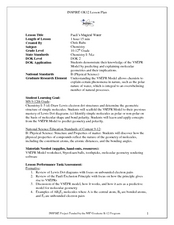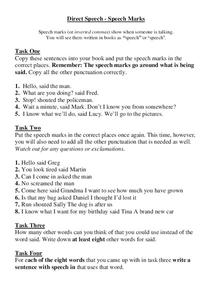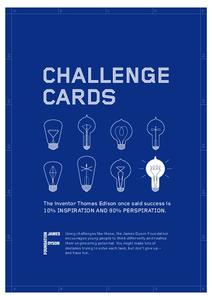Curated OER
Nets
In this cube worksheet, learners work with nets of a cube and determine which net makes an cube. Students answer 7 questions.
Curated OER
Faces, Vertices, Edges
Students identify the parts of three dimensional objects. In this geometry instructional activity, students find the number of faces, edges and vertices. They differentiate between prisms and polyhedra.
Curated OER
Molecular Models
In this molecules worksheet, students use a molecular model kit to build a molecule, draw a 3-D structure and describe its shape. This worksheet has 2 graphic organizers.
Curated OER
Faces, Edges, and Vertices
In this solid figures worksheet, students learn to identify solid figures by their faces, edges, and vertices. Students solve six word problems about the solid figure characteristics.
Curated OER
What Do You Know About Saturn?
Students discuss what they know about Saturn. They create drawings to show what the planet looks like and identifies its characteristics. They write a paragraph about the planet as well.
Curated OER
Weather Review
In this weather instructional activity, learners reviews terms associated with measuring different weather phenomena plus draw examples of different types of fronts on a weather map. This instructional activity has 5 true or false, 15...
Curated OER
Prime and Composite Numbers
Sixth graders inspect prime and composite numbers. Using graph paper, they draw as many different shaped rectangles as possible. They use the dimensions of the rectangles to discuss prime and composite numbers. Students create a chart...
Curated OER
Geography: Mapping Neighborhoods
Students examine their neighborhoods and draw maps reflecting land use. In addition, they make predictions about their community's future. Students also consider the impact of business and industry on their communities and predict ...
Curated OER
House Dimensions
Fourth graders measure the perimeters of several different rooms. They convert the measurements using ratios that allow them to draw the rooms to scale on paper. They draw the dimensions of a house to scale. They measure length to the...
Curated OER
Joseph Holston Exhibition Lesson Plan
Students, in groups, view original artworks by Joseph Holston in a gallery space. They create a genre work of art that emphasizes the use of the artistic elements line, color, and shape.
Curated OER
Physics: Visualization of Hydrogen Wave Functions
Students explore various methods for visualizing the results of hydrogen wave function. They observe trends using a polar plot tool and make plots for the first three energy levels of the radial wave function for hydrogen. Students apply...
Curated OER
Color and Composition for the Creative Quilter
Students explore free-motion machine quilting through three exercises. They enhance patterns, make their own patterns and stitch a realistic quilted drawing. Students create a color wheel and develop a variety of methods that enable them...
Curated OER
Angles and Parallel Lines
Sixth graders draw parallel and intersecting lines to observe and examine the characteristics of alternate interior angles, vertical angles, corresponding angles, and supplementary angles. Through observation, they discover the...
Curated OER
Cells, The Structural and Functional Units of Life
Students observe the general structure and organelles of plant and animal cells. Students prepare microscope slides of elodea, onion, check, and cork and identify the cells by size and shape as unicellular, multicellular, plant or animal.
Curated OER
Rainforest Exploration
Fourth graders learn the simple concepts of the rainforest and its inhabitants. They create a 3-D rainforest using one of the animals learned about.
Curated OER
More than Masks
Middle schoolers design their own mask using the face as the base. Using pieces of acetate, they mold the material into the shape of their face and turning it into an animal. They must draw their design and calculate the measurements...
Curated OER
Fossil Guide
Students produce a "Fossil Guide" that covers twelve fossils and includes a drawing and written description for each fossil. The written description should include such things as size, shape, and general appearance.
Curated OER
Pauli's Magical Water
Students predict the shape of molecules using VSEPR theory. In this chemistry lesson, students differentiate a polar and nonpolar molecule. They discuss why water's polarity is very important.
Curated OER
Right Angles in the Classroom
In this finding right angles worksheet, learners look around the classroom and draw any right angles they see. Students then "tick" any right angle in 6 geometric shapes.
Curated OER
Houses and the People They Shelter
Students examine different homes and shelters across cultures and time periods. In this Houses and the People They Shelter lesson, students draw conclusions about society and culture according to the features of their dwellings. Students...
James Dyson Foundation
Challenge Cards
Can you build it? Yes you can! This interactive game includes four design challenges presented on separate cards. The cards outline the challenges with limited restrictions but with an end goal in mind. The competitions include building...
Curated OER
Mean and Standard Deviation
Get two activities with one lesson. The first lesson, is appropriate for grades 6-12 and takes about 20 minutes. It introduces the concept of measures of central tendency, primarily the mean, and discusses its uses as well as its...
Curated OER
What are the Kinds of Triangles?
Fifth graders classify triangles. In this triangle lesson, 5th graders learn about the characteristics that make up a triangle. They are instructed through video, PowerPoint slides, and teacher-led demonstrations.
Curated OER
Wetland in a Pan
Seventh graders build a watershed from various materials. In this life science lesson plan, the students will be able to change the design of their watershed to see the changes in the way the water will drain. Each group will be able to...























